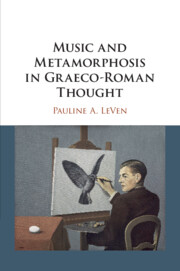Book contents
- Music and Metamorphosis in Graeco-Roman Thought
- Music and Metamorphosis in Graeco-Roman Thought
- Copyright page
- Dedication
- Contents
- Acknowledgments
- Abbreviations
- Introduction
- Chapter 1 Forest: On Surrounds
- Chapter 2 Ringdove: On the Uncanny Power of Performance
- Chapter 3 Cicadas: On the Voice
- Chapter 4 Echo: On Listening
- Chapter 5 Reeds: On Musical Objects
- Chapter 6 Nightingale: On Expression
- Chapter 7 Beetle: On Rhythm
- References
- Citations Index
- Subject Index
Introduction
Published online by Cambridge University Press: 25 November 2020
- Music and Metamorphosis in Graeco-Roman Thought
- Music and Metamorphosis in Graeco-Roman Thought
- Copyright page
- Dedication
- Contents
- Acknowledgments
- Abbreviations
- Introduction
- Chapter 1 Forest: On Surrounds
- Chapter 2 Ringdove: On the Uncanny Power of Performance
- Chapter 3 Cicadas: On the Voice
- Chapter 4 Echo: On Listening
- Chapter 5 Reeds: On Musical Objects
- Chapter 6 Nightingale: On Expression
- Chapter 7 Beetle: On Rhythm
- References
- Citations Index
- Subject Index
Summary
Where does music come from? What is at the root of musical pleasure? What can a song do? Are musical instruments endowed with magical power? Can music die? These are some of the questions that the Greeks and the Romans asked about music, song, and the soundscape within which they lived, and that this book examines. Mythical narratives (which the Greeks variously called mythoi or logoi, and the Romans fabulae) are the earliest, longest-lasting, and most privileged place where the ancients engaged with such issues and suggested answers to these questions. Greek and Latin literature and iconography are replete with mythical figures who play music, sing, and dance: the gods Apollo, Hermes, Pan, and Faunus; the Muses, the Sirens, the Camenae, a whole set of nymphs; the heroes Orpheus, Amphion, Marsyas, Linos, Thamyras, and Arion. But in the vast repertory of myths featuring melodious gods and music-making heroes, one type of scenario stands out: narratives recounting the metamorphosis of a human being into a musical animal (a bird or an insect), or into a feature of the acoustic landscape (an echo or the whisper of reeds). These are the narratives this book will focus on. One of them (the myth of the queen-turned-nightingale) already appears in one of our earliest surviving epics – the Odyssey. But it is only after the fourth century BCE that myths of metamorphosis start multiplying; different narrative versions continue to be reworked and we find them in even greater numbers in Imperial literature, in texts written between the first and the third centuries CE. These myths of metamorphosis feature in a great variety of genres: not only in Greek and Latin prose or verse collections of “metamorphoses,” but also as learned passages inset into Imperial Greek romances.
- Type
- Chapter
- Information
- Music and Metamorphosis in Graeco-Roman Thought , pp. 1 - 9Publisher: Cambridge University PressPrint publication year: 2020



